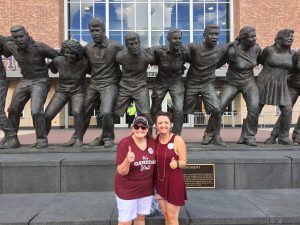Returned AgriCorps Fellow: Megan Harper
Placement: Booker Washington Institute & Post-Secondary Professional Program, Kakata, Margibi County, Liberia
Class: 4 (2017-18)
What are you up to now? Tell us about your day-to-day duties.
I am currently a graduate student at Texas A & M studying for a Master of Science in Agricultural Economics. Day to day looks like class, homework, walking my dog, keeping up with my research topic, and being a teacher’s assistant for a couple classes. My advisor, Dr. Joe Outlaw, is great about providing us (his graduate students) with outside opportunities such as meetings, conferences, and conventions to enhance our graduate classroom learning. In high school and undergrad, I learned just enough to get a desired grade. Now, I am more appreciative and grateful to be afforded the opportunity to learn; I am humbled and conscious of the fact that many of my Liberian students will probably will not be afforded the same. Prior to living in Liberia I never realized the far-reaching effects of illiteracy and innumeracy. Being able to read and write affords us the ability to learn for ourselves. Reading allows for new breadth and depth of knowledge, for one to make new associations, and create.
How did your time as an AgriCorps Fellow influence the next step in your career?
For me and my current role as a graduate student this question ties into the previous one in valuing education and taking advantage of the opportunity to pursue higher education. Due to my time in Liberia, I certainly have a far greater appreciation for the life phase I am in now as a graduate student. My experience in Liberia did more than influence my career, it influences every facet of my life. When I buy groceries or clothing, I am far less quantity and materialistically minded, however I do place more value on quality. When a job peaks my interest by talking about development, I can and do think about whether it is just to sound good to developed country consumers or if it is really empowering people in developing countries.
What similarities do you see in ag education in the U.S. and Liberia?
In both countries, memorization is the core of the education system. The students are similar; some are eager to learn while others are less eager. Both of the schools in Liberia I taught at have a FFA Chapter. In both the U.S. and Liberia, learners are developing leadership skills and broadening their horizons through FFA experiences. In both nations, one can see young people that want to learn and are passionate about the future of their respective countries. They are excited about building bridges for an exchange of knowledge and trade within their borders and across them.


